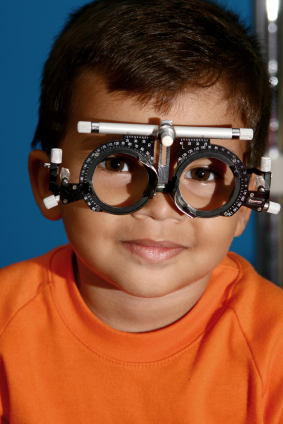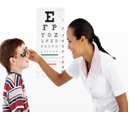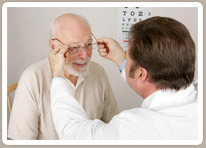Importance of Regular Eye Exams

The American Academy of Ophthalmology recommends that most people have an eye exam every one to two years depending upon age and health. An annual eye exam is one of the most important diagnostic and preventative measures you can take to protect your vision and health. If you are in a higher-risk category for eye disease or complications your eye doctor may recommend more frequent exams. If you notice a change in your vision or receive an injury to your eye, you should contact your eye care professional immediately.
While this information is helpful, it should not be construed as medical advice. For more detailed explanation on any of these topics, please consult your eye care professional.
Vision Examinations for Children




When parents fail to get regular vision examinations for their children, they are putting more than eyesight at risk-they are threatening their children's educational development as well. One out of every four children from ages five to 12 has a vision problem that could affect their educational performance. While parents often are quick to schedule regular physical checkups for their children, they might overlook the importance of a professional eye examination. Screenings offered at schools are designed to identify problems with a child's vision. However, they simply are not thorough enough to expose problems of eye muscle coordination, eye disease or peripheral vision or short-comings in near-distance vision---areas very important to the learning process.
Parents should not wait until their children report visual problems. With some visual skills reaching full development at about 5 years of age, correction after this point becomes more difficult. Visual defects discovered before this age can be treated; therefore it is vital for parents to schedule regular eye examinations as recommended by the American Optometric Association. Parents should pay attention to these indications that a child might be experiencing problems:

- squinting
- reading from books held unusually close to the face
- eyes pointing in different directions
- twisting or tilting of the head to favor one eye
- headaches and dizziness
- blurred or double vision
- ability to read only for a short period of time
- frequent blinking or rubbing of eyes
- inability to judge distance properly (bumping into things)
- using a finger to follow words when reading
- poor school performance
- poor athletic performance
A child's eye examination involves the comprehensive testing of anatomical, functional and perceptual development. It usually begins with a review of the family's medical history (some visual problems are hereditary), a review of the child's visual history, and a test to check for visual acuity or clarity of vision. Your child will also be dilated with drops that affect your childs ability to accommodate resulting in a more accurate glasses determination. Our physician will perform an external examination for structural anomalies such as the position of the eye in the socket and the extent of tearing and lubrication. This is followed by an internal examination in which the doctor uses an ophthalmoscope to look into the eye and examine the retina or inner lining of the eye. Subsequent testing can check the child's ability to interpret color information and visually track a moving object. Children may even be screened for glaucoma.

